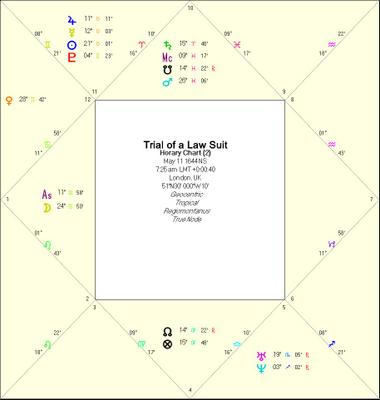Weekly Horary: Should I Go Live in This Ashram?
 CLICK TWICE ON THE IMAGE TO VIEW THE HOROSCOPE IN FULL DETAIL.
CLICK TWICE ON THE IMAGE TO VIEW THE HOROSCOPE IN FULL DETAIL.Remember to send in your questions for next week's horary to nina "at" gryphonastrology.info. Thanks!
Background: The querent is very seriously considering going to live in an ashram in India (definition from zoofence.com: ashram is “a Sanskrit word indicating a spiritual community or any place where seekers meet, presumably for instruction, under the authority or auspices of a guru”).
The querent has been dissatisfied with what he perceived as his materialistic existence and wants to direct his energies in a more spiritual direction. He had visited the ashram twice and was impressed with the charismatic guru who leads and presides over this spiritual community.
Living in the ashram would be a major step for this Westerner, both because he would be entering a hermitage lifestyle and because he would move to a foreign country.
Short Answer: You will do well at the ashram, but with some major caveats. It appears that you currently do not have all the information, or are even a bit blinded by your own expectations. While you probably like the community because the people treat you as an honored guest when you visit, the spiritual values or spiritual direction of the ashram seems to have some problems. Further, the ashram itself seems to be in disrepair on a physical or even more metaphorical level.
The chief concern, however, is the guru/director. He and you do not seem a very good match in terms of forming a positive lifelong relationship. In the near future, you may find that the two of you have some differences, which will lead you to abandon your plan to move there.
Finally, it appears that much of your current anguish comes from hating your job, and the only thing making it more bearable now is that you’re considering leaving. It may be more productive and satisfying to reorient your career course than to make a drastic lifestyle change you could later regret.
Astrology:
- Will he be happy in the ashram? The Querent’s planets are Saturn and the Moon. The ashram itself is signified by the Ninth House of monasteries, spiritual retreats, and long journeys, and its ruler, Venus. Picking up Saturn and dropping it just inside the 9th cusp shows us how the Querent will do in the ashram. Saturn is exalted in Libra, and so is quite strong. From this we can see that the Querent is treated with extra respect when he is there, and also feels he can get in touch with his highest (exalted) spiritual urgings when he is there.
- What is going on with the Querent? He is blinded at the time, and does not have all the necessary information; his significator, Saturn, is combust. Luckily, the Sun is moving away from Saturn, indicating that shortly, the veil will be lifted from the Querent’s eyes and he will see previously hidden information. The Moon is in Venus’s sign and so is very interested in the ashram. Saturn is about to be squared by a very essentially weak Mars in Taurus in the 3rd house. Mars rules the Querent’s 3rd and 10th houses, so we can surmise that the Querent is being harmed by his job and it’s only bearable because he’s considering leaving (Saturn recently left Cancer, the fall of Mars). This issue may be at the heart of the matter and should be addressed before making any major changes.
- What about the ashram itself? Its ruler is Venus in Virgo in the 8th house, and as such is dreadfully accidentally debilitated. This transforms a natural benefic into an accidental malefic, implying that there is something very wrong with the ashram, either spiritually or physically. Moreover, Jupiter, the natural ruler of religion, is very weak, is peregrine just inside the 9th house and is conjunct the South Node. This further shows that the spiritual direction of the ashram is not good, perhaps even perverse in some sense.
- What about the guru? We can take Mercury as the director of the ashram, since he rules Venus. Fortuitously, Mercury also rules the 10th house from the 9th, another symbol of the ashram’s boss. Mercury is peregrine in Leo, is also retrograde, and is under the sunbeams. In short, the guru is very weak, and probably does not have the very best of intentions – Mercury’s notion of honesty is notoriously negotiable, and because it’s peregrine, it tends more toward evil than good. Mercury is in Saturn’s detriment, so the guru harms the Querent. Meanwhile, Saturn is not in Mercury’s dignities, so perhaps the Querent doesn’t care for the guru quite as much as he says. The Moon’s next aspect is a square to Mercury, again with no reception between the two, implying that there may be some difficulties between the Querent and the guru in the near future, and may lead to Querent’s abandoning his plan.


